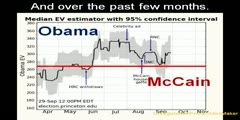Lec 6 -Year 2008 - Efficient Markets vs. Excess Volatility
Efficient Markets vs. Excess Volatility Financial Markets (ECON 252) -Year 2008 Several theories in finance relate to stock price analysis and prediction. The efficient markets hypothesis states that stock prices for publicly-traded companies reflect all available information. Prices adjust to new information instantaneously, so it is impossible to "beat the market." Furthermore, the random walk theory asserts that changes in stock prices arise only from unanticipated new information, and so it is impossible to predict the direction of stock prices. Using statistical tools, we can attempt to test the hypotheses and to predict future stock prices. These tests show that efficient markets theory is a half-truth: it is difficult but not impossible for some people to beat the market. 00:00 - Chapter 1. Last Thoughts on Insurance and Catastrophe Bonds 06:28 - Chapter 2. Information Access and the Efficient Markets Hypothesis 20:00 - Chapter 3. Varying Degrees of Efficient Markets and No Dividends: The Case of First Federal Financial 41:44 - Chapter 4. The Random Walk Theory 51:30 - Chapter 5. The First Order Auto-regressive Model 56:59 - Chapter 6. Challenges in Forecasting the Market Complete course materials are available at the Open Yale Courses website: http://open.yale.edu/courses This course was recorded in Spring 2008.
Video is embedded from external source so embedding is not available.
Video is embedded from external source so download is not available.
Channels: Finance
Tags: AR-1 efficient markets hypothesis first order auto-regressive model random walk theory stock market prices volatility
Uploaded by: yalefinanmarkets ( Send Message ) on 20-08-2012.
Duration: 68m 18s
Here is the next lecture for this course
Lec 7 - Efficient Markets
01:07:45 | 2621 viewsLec 17 - Options Markets
01:11:57 | 2565 viewsTheory of Metallic Conduction: Biased Ran ...
00:12 | 6114 viewsLec 13 - Demography and Asset Pricing: Wi ...
01:12:22 | 2837 viewsLec 15 - Forward and Futures Markets
01:12:37 | 2785 viewsAfter the Failed Bailout and Stock Market ...
05:00 | 3053 viewsLec 11 - Law 270.6 Deregulation and Mark ...
01:11:00 | 2617 viewsLec 10 - A New Vision for Capital Markets
54:57 | 3147 viewsLec 12 - Law 270.6 Climate Change and Ca ...
02:32:14 | 3288 viewsLec 1- Why Finance?
01:14:17 | 2226 viewsLec 4 - Portfolio Diversification and Sup ...
01:18:01 | 2739 viewsLec 14 - Deregulation and Markets & Env I ...
02:37:19 | 2153 viewsLec 40 - Bailout 4: Mark-to-model vs. mar ...
11:24 | 2987 viewsLec 4 - Bailout 4: Mark-to-model vs. mark ...
11:24 | 2353 viewsLec 83 - Carnot Efficiency 3: Proving th ...
12:17 | 2571 viewsNo content is added to this lecture.
This video is a part of a lecture series from of Yale
















